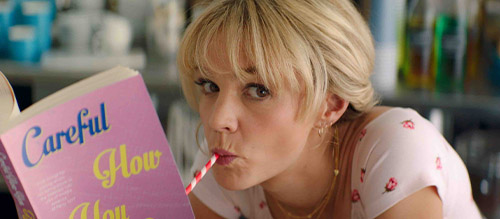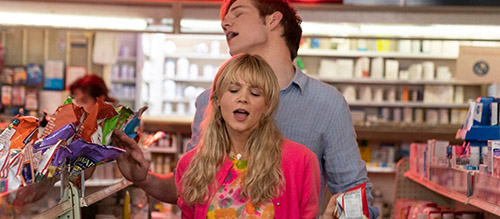Promising Young Woman (2021) Review
Promising Young Woman (2021)
Director: Emerald Fennell
Screenwriter: Emerald Fennell
Starring: Carey Mulligan, Bo Burnham, Alison Brie, Adam Brody, Jennifer Coolidge, Laverne Cox, Christopher Mintz-Plasse, Molly Shannon, Max Greenfield, Chris Lowell
Statistics vary depending on location, but, on average, one in every five women will experience some form of sexual assault in their lifetime. It’s a staggeringly high percentage, but one many people will not find surprising. Sexual assault is a pandemic in its own right. Yet, instead of reporting the daily figures on prime time news each day, or orchestrating a worldwide effort to bring it to an end, we allow women to walk home with keys clenched between their knuckles as we redundantly remind them not to invite unwarranted sexual attention through their personal fashion preferences – as if this will be enough to keep them safe.
When it happens to you, it doesn’t happen how you thought it might, and the world doesn’t react how you assumed it would. Just look at somebody like Brock Turner, who, after committing a violent sexual assault on an intoxicated fellow student – a crime ordinarily punishable with a fourteen-year sentence – served only three months in prison: the lenient verdict a product of white privilege and the judge’s own feeling that Brock, a swimming champion, would be negatively impacted by lengthy imprisonment. We live in a world where an accusation or conviction of assault is now deemed just as brutal and life-altering as assault itself; a dynamic Emerald Fennell explores the hypocrisies of in her debut feature, Promising Young Woman. In one scene, a so-called ‘nice guy’ suggests to Cassie, our promising young woman in question, that it’s a guy’s worst nightmare to be accused ‘like that’. To this, Cassie replies: ‘Can you guess what every woman’s worst nightmare is?’.
Cassandra Thomas (Carey Mulligan), a thirty-year-old barista and med-school dropout, comes to a stalemate with life. Consumed by a seven-year-old ‘incident’ involving her childhood friend Nina, Cassie isolates herself from the possibility of functioning like a regular person. We never hear the specifics of this incident; what exactly happened to Nina is left vague in an attempt to mimic the experience of disregard felt by actual victims of assault. Do you remember the name of Brock Turner’s victim? Instead, Cassie, like Frances McDormand’s Mildred in Three Billboards Outside Ebbing Missouri, dedicates her time to tactically seeking out a form of, not revenge, but justice – a way to do something material with the pain of her trauma. To highlight that people capable of assault can look like anyone, be of any age and from any background, Fennell has Cassie loiter inside nightclubs, using herself as inebriated bait, to which predatory men, in all of their forms, gravitate. Cassie frightens the boys when she reveals herself to be sober – a fact many of them find to be a turn-off anyway. However, no matter how many deviant men she teaches a lesson (a notebook she keeps as record speaks to a high volume of them), the catharsis she yearns for never arrives. That is until a chance meeting with a former classmate, Ryan (Bo Burnham), provides Cassie with an access route to a more exact and tenacious form of vengeance.
We follow Cassie as she comes up against the guilty faces of her past. She confronts them with manipulation, fear and threat, forcing them to acknowledge their roles not only within the sexual assault of her friend but within the system of rape culture as a whole; a system that fails to hold men accountable for their crimes. Promising Young Woman does this with tact, slowly dismantling the layers of shame-culture and victim-blaming that normalise sexual violence. Cassie’s plot for justice highlights all those responsible: from the perpetrators themselves to disbelieving classmates, and education professionals who choose to turn a blind eye and disregard their duty of care. Cassie comes for all genders and ages; anyone whose silence, prejudice or failure to act has long enabled the cycle to continue. The film encourages self-introspection, too, forcing us, with its nuanced exploration of these themes, to ask ourselves if our own actions and opinions have a place in the ruling toxicity of normalised sexual violence.
Fennell and costume designer Nancy Steiner – who received acclaim for her work on Sofia Coppola’s The Virgin Suicides – use style and fashion to subvert the typical expectation of a woman on a mission such as Cassie’s: blood, gore and practical dress, the classic symbology of the ‘revenge’ narrative, is actively lacking. Instead, Steiner dresses Cassie in bubble-gum pinks and pretty florals, her hair neat, her make-up done, her nails painted, her outfits beautifully executed with details and accessories to match. Fennell weaponises Cassie’s femininity and the effeminate connotations of the colour pink; the aesthetically pleasing stylisation of Cassie’s wardrobe serving as armour against the weaponry and semantics of rape culture.
The effort to subvert genre continues through savvy casting decisions. Men we usually associate as loveable and, more importantly, harmless, crop up throughout the film: millennial treasure and stand-up comic, Bo Burnham; silly and eccentric Max Greenfield of ‘New Girl’; Superbad’s McLovin aka Christopher Mintz-Plasse; the puppy-eyed Chris Lowell of ‘GLOW’, and teen heartthrob of ‘The O.C.’, Adam Brody. With the presence of these much-loved, lusted after men, Fennell toys with our preconceptions of what we expect males in (and surrounding) sexual violence narratives to look like – they can be anyone, any age, or people we know and even admire. Other supporting actors feel complimentary of the film’s aesthetic in a variety of ways. The decision to cast Jennifer Coolidge as Cassie’s Mother feels like a particular stroke of genius: her comedic, chick-flick legacy gifts the film a glamorous and nostalgic tone. Laverne Cox, Alison Brie and Connie Britton bring a concoction of talent; they are the mixer to a perfect, pink cocktail, respectively adding sweet, sour, and bitter flavours into the mix.
However, by far the most crucial player is Carey Mulligan. Known for her exquisite character work in independent film (Paul Dano’s Wildlife, Lone Scherfig’s An Education), Mulligan often gravitates toward complex female characters. As Cassie, Mulligan makes moves to untangle the knots of Hollywood’s perception of femininity. Her characterisation work isn’t as black and white as a hero looking for revenge upon a villain. Instead, Cassie is messy; she pushes the boundaries; she steps out of the acceptable space female characters usually operate within. Mulligan explores these shades of grey expertly, dark and threatening when she needs to be but comical enough to keep up with Burnham’s effortless wit. Mulligan’s work here highlights just how much a woman must sacrifice in order to bring rapists to justice.
Fennell filters every detail through a highly exceptional and boldly cinematic narrative, exposing the very real-world double standards and gross judgemental attitudes surrounding rape. Even the film’s soundtrack, which includes Paris Hilton’s “Stars Are Blind’ and a sinister string version of Britney Spears’ ‘‘Toxic’’, works to exacerbate Fennell’s vision. Hilton and Spears have their sexuality and mental health discussed like cheap gossip on a global scale; the stories behind their music further highlights all women’s struggle for control over their agency. Fennell uses these details to rewrite the script and confront dismissive, ingrained attitudes to all things considered ‘girly’.
Given the extent to which Promising Young Woman asks its audience to confront their beliefs and behaviour, the film will be a complicated watch for many. Yet, like it or not, it’s time we bring this conversation into the mainstream. Sexual assault doesn’t just happen to women as conventionally attractive as Margot Robbie; it’s an issue anyone can come into contact with. Let this film act as a means to silence dismissive voices and teach the importance of believing women.
24/24



